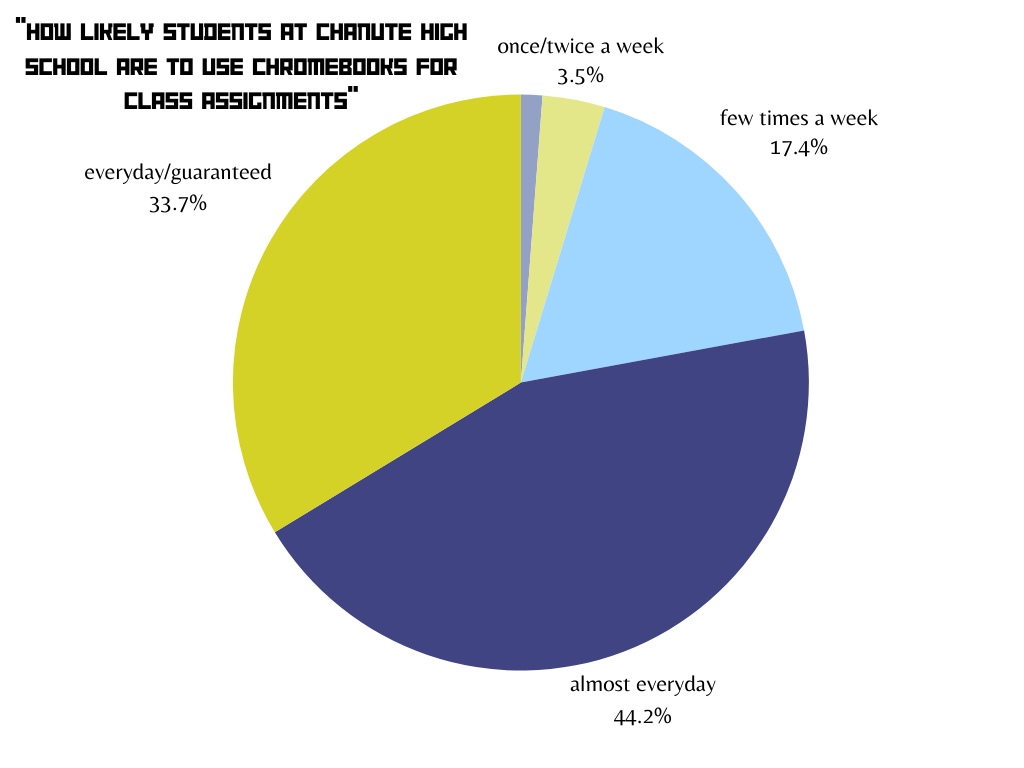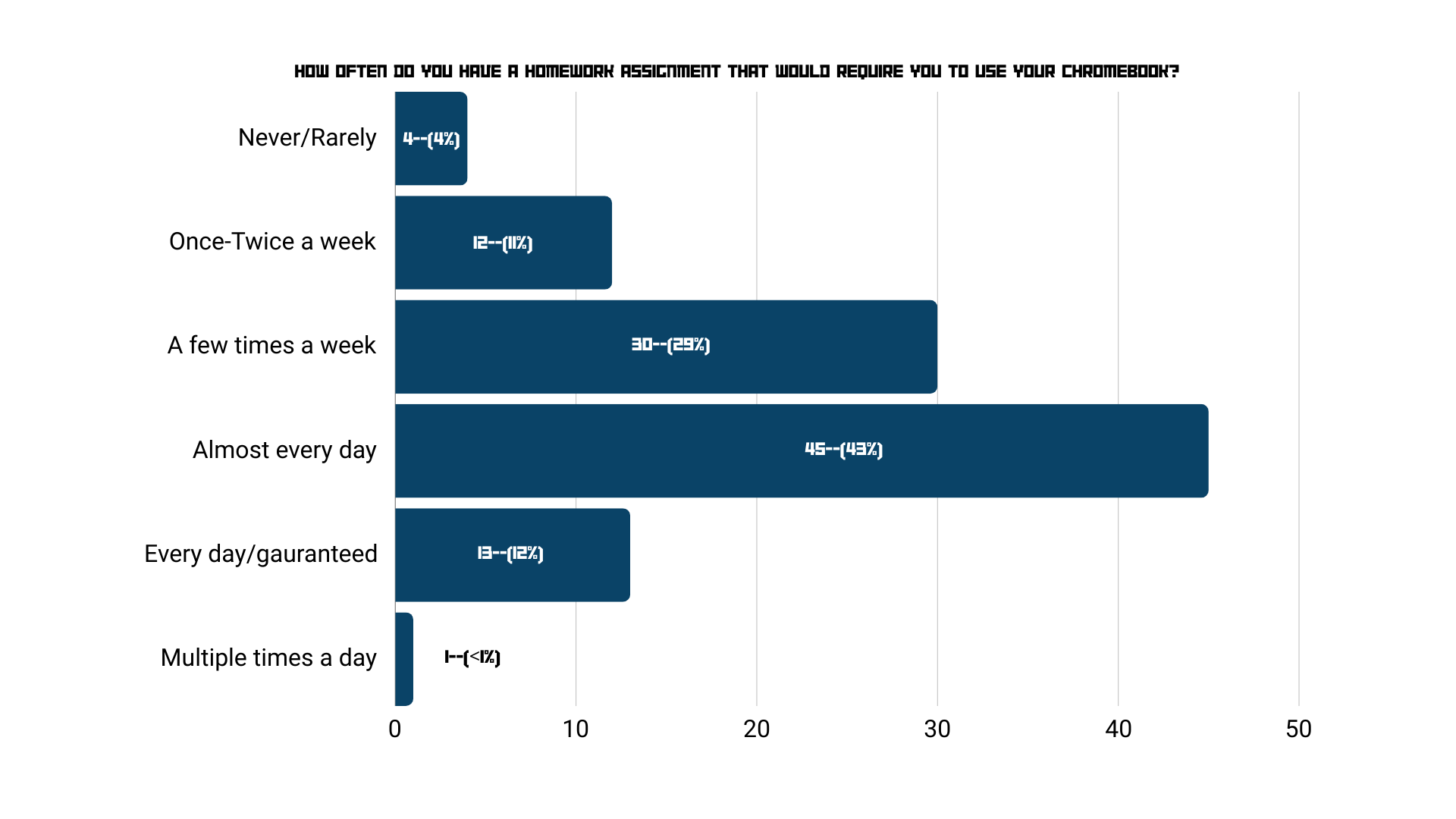Many students at Chanute High School (CHS) use digital devices including, but not limited to, cameras, Chromebooks, and desktop computers in order to complete assigned school work every day. In fact, there are some classes that revolve almost entirely around using some sort of technology, such as Journalism, Graphic Design, Audio/Visual Production, Computer Science, and many more. Even if the class doesn’t revolve around using electronic technology, most classes use a lot of online programs for homework and reviews such as Kuta Works, Gimkit, Peardeck, and Quizlet.
A Google form was sent out to the entire student body of Chanute High School via email. Upcoming is the resulting data gathered from the survey.

This pie chart represents how often the student body needs to use a Chromebook to complete their assignments. The data shows that the majority of students use Chromebooks for classwork from multiple classes most days of the week. In fact, it shows nearly four out of every five students use their Chromebook most days of the week, and one out of every three students consistently use their Chromebook every day.

This graph represents how often the student body needs to use a Chromebook to complete their assignments. The data shows that the majority of students use Chromebooks for classwork from multiple classes most days of the week. In fact, it shows nearly four out of every five students use their Chromebook most days of the week, and one out of every three students consistently use their Chromebook every day. The graph shows that over 95% of students use their Chromebook at least once a week, and nearly half of all students use their Chromebook every day. Information pulled from the survey shows the majority of class assignments and homework given to students at CHS requires the use of an electronic device.
Now, these graphs show data for the classwork at Chanute High School, but what about how people use Chromebooks outside of completing assignments? According to the survey our team sent out, the majority of students will use their Chromebook to complete assignments, and when they are not completing schoolwork, they are likely to be playing games or listening to music. Some also informed us they enjoy watching entertaining videos, writing, applying for scholarships, and researching topics of interest. The majority of students at Chanute High School use their Chromebooks regularly between completing assignments, homework and various other uses that benefit them in their free time.
Above is a video overviewing the interviews conducted with teachers and students at Chanute High School.
Teachers largely agreed on several points, including that technology is not always a positive. ¨There are a lot of ways a Chromebook can be a distraction in class,¨ English teacher Isaac Robinson said. However, all share the sentiment that Chromebook availability seems to present more pros than cons. Robinson lightheartedly commented on an issue that teachers all around the country face regularly. ¨I don’t have to read student handwriting that often,¨ Robinson said.
Kurt Sizemore, a history teacher, restates Robinson’s dislike of the distraction readily available to students, while adding another positive aspect. “Technology always makes students more open to learning new techniques and getting to know knowledge quicker, but students are very distracted by technology on a daily basis, the gaming, the Snapchats, the things like that that kids do every day obviously interrupts their learning,” Sizemore said.
According to the teachers that were interviewed, there has been a change in Chromebook usage in most core classes since the pandemic. “Before the [the pandemic] I did not use Google Classroom, almost everything I had students turn in was pencil and paper,” Robinson said. “Starting with the pandemic, we were all forced to start using Google classroom. It turns out, was very, very useful and convenient. There are a lot more options for doing assignments [and] turning in assignments.”
Before recent years, students at CHS were also able to use their phones to complete assignments. Our team went out and personally interviewed students and teachers about the school’s phone ban policy that has been instilled over the past two years as a response to complaints of cyberbullying and distractions during classes.
Mandy Duling, a science teacher, states that the phone ban policy is “great… [and] when they’re not as distracted…student’s overall grades are better now that we don’t have cell phones…” Robinson was able to shed some light on the troubles of the year when the phone ban policy was first instilled, compared to the second year of the policy being in place. “Initially it was an issue because I had to spend a lot of time arguing with students about phones…this school year, students seem more ready to leave their phones behind, or at least more ready to pretend…”
Overall, the teachers seem to agree that the use of Chromebooks has presented more convenience than trouble to their classrooms, and they are glad that the school has instated a total ban on students having their phones during the school day. The school appears to have made the teachers happy regarding technology in the school, but what about the students?
Students believe that the phone ban was a well-intentioned plan that did not have all the intended effects. Students that were interviewed informed us that their peers will still use their phones during class -only sneakier- and will go to the restroom just to check their Snapchat or Instagram. Students informed us about their peers finding a way to access web versions of their favorite social media apps, Snapchat and Tiktok, on their school Chromebooks. How could they access them, you might ask? There was a trend in the school, mostly popular amongst the freshmen of CHS, of resetting the Chromebooks to factory settings, giving them access to almost every website that was blocked by the school administration.
Eventually, the faculty caught wind of this trend and required all of the Chromebooks to be returned to the school’s IT staff. They discovered who had jumped on the bandwagon and reset those Chromebooks back to the appropriate settings, also adding extra protection against students resetting them to all Chromebooks.
It is safe to say that technology is used at Chanute High School in a plethora of different ways. Teachers agree that easy access to technology does have a fair share of issues and complications, the convenience, amount of easily available sources, and easier connection significantly outweigh the negative aspects. While students and staff may never fully agree on the usage and integration of technology in the classroom, the evidence shows that technology has a vast range of uses, both objectively good and bad, and is most likely here to stay at Chanute High School.

